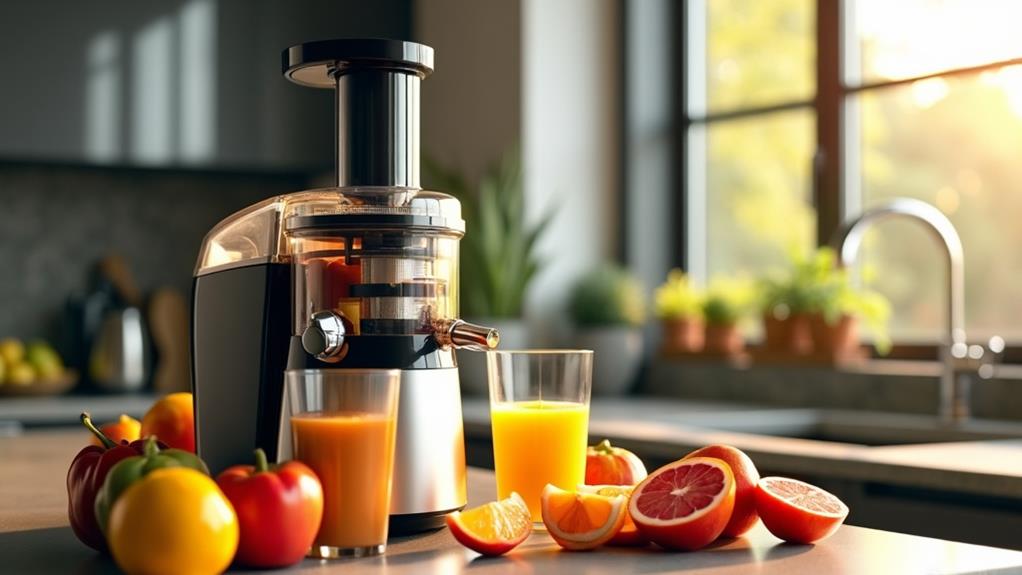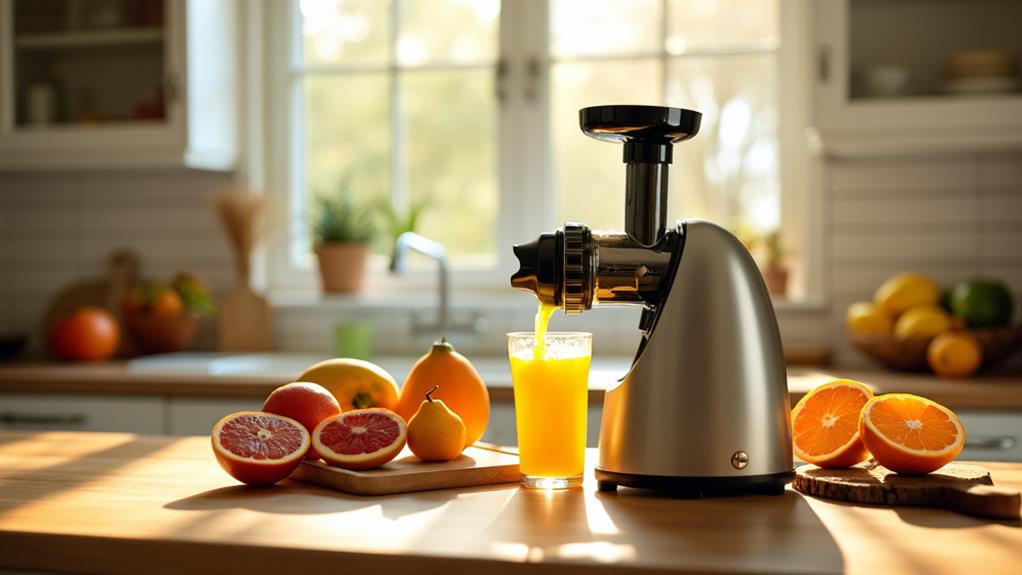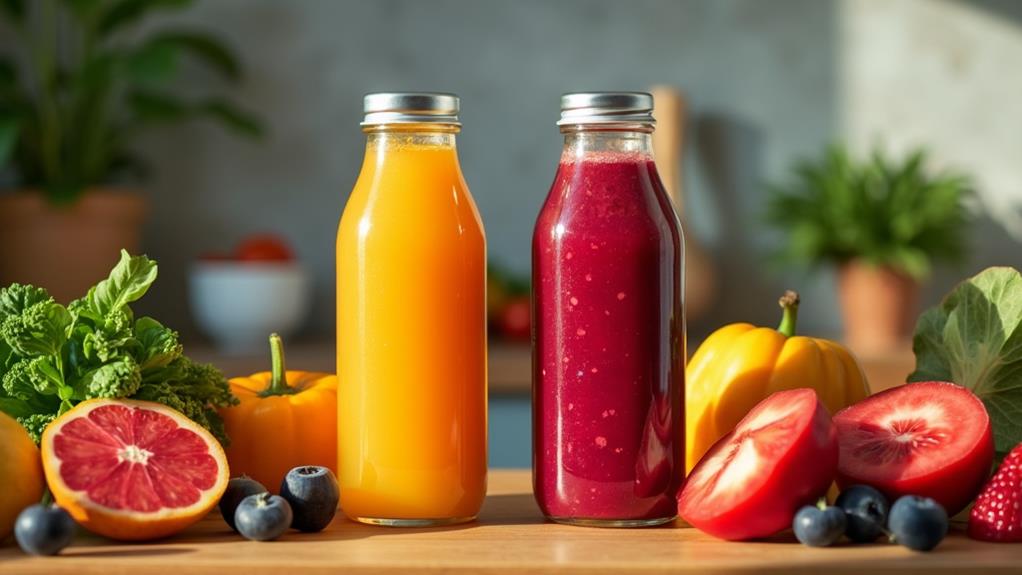Understanding the Differences Between Juicers
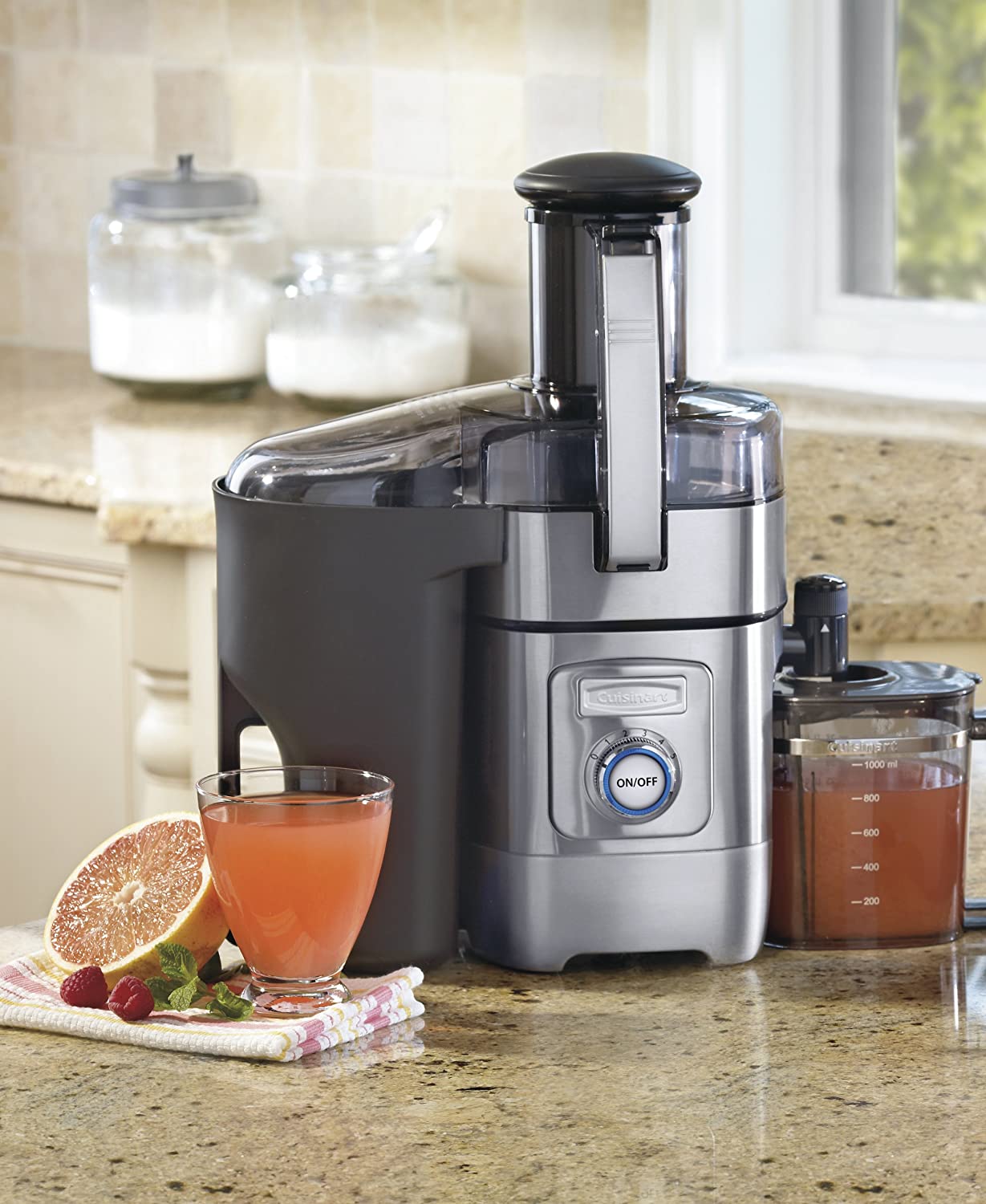
When you're trying to understand juicer differences, focus on efficiency, nutrition, and cost. Centrifugal juicers work fast but may lose nutrients due to heat. Masticating models preserve more nutrients and offer better juice yield, though they're slower and pricier. Cold press juicers excel at keeping enzymes and are great for nuts and greens. Twin gear juicers handle fibrous veggies well but come with a steep price tag. Citrus juicers are fast, affordable, and specialized for citrus fruits. Each type has unique cleaning needs and maintenance tips, so exploring further will unravel the perfect fit for your lifestyle.
Types of Juicers
When delving into the world of juicing, understanding the different types of juicers is essential. Centrifugal juicers operate with high-speed spinning blades, ranging from 10,000 to 25,000 RPM. They're perfect for quick juice extraction from hard fruits and vegetables, but be aware that this speed generates heat, which can lower nutrient retention. If nutrient retention and juice yield are your priorities, consider masticating juicers, also known as slow juicers. These use a low-speed auger mechanism, around 46 RPM, to crush and squeeze produce, resulting in juice with a higher nutrient content and a longer shelf life.
Cold press juicers offer a unique approach by using slow grinding and hydraulic pressing. This method excels at preserving enzymes and nutrients, making these juicers ideal for leafy greens and even nuts. If you're looking for exceptional nutrient extraction, Twin Gear juicers are unmatched. They employ dual gears to efficiently handle a wide variety of produce, including fibrous vegetables and wheatgrass. However, they usually come with a higher price tag. Finally, citrus juicers are a specialized option, designed specifically for citrus fruits, providing a quick and budget-friendly way to enjoy fresh juice. Understanding these types of juicers helps you choose the right one for your needs.
Pros and Cons
Choosing the right juicer for your needs involves weighing the pros and cons of each type. Centrifugal juicers are all about speed and ease of use. They spin at over 10,000 RPM, making them perfect for quick juice extraction, especially from hard produce. But, there's a trade-off. The process generates heat, which can reduce the nutrients and juice quality, leading to less fresh juice. They're also less effective with leafy greens, resulting in a lower juice yield.
On the flip side, masticating juicers focus on juice quality and nutrient retention. Operating at around 46 RPM, they slowly extract juice, preserving enzymes and vitamins for a higher yield and superior taste. However, these juicers involve a more time-consuming process and often require more prep work. They're typically more expensive, but if you're health-conscious and want nutrient-rich juice, they're worth considering.
Here's what you might feel when choosing:
- ⚡ Rushed mornings? Centrifugal's speed is your friend!
- 🍏 Craving more nutrients? Masticating's got you covered!
- 💰 On a budget? Centrifugal might be the way to go!
- 🥦 Love leafy greens? Masticating excels in extraction!
Decide based on your lifestyle and juicing priorities!
Cleaning and Maintenance
Maintaining your juicer's cleanliness is essential for peak performance and juice quality. Regular cleaning after each use prevents residue buildup that can compromise both performance and juice quality. In terms of cleaning, centrifugal juicers tend to have the upper hand due to their fewer components. Many models even offer dishwasher-safe parts, making maintenance a breeze. Simply disassemble, rinse, and let your dishwasher do the rest.
On the other hand, masticating juicers require a bit more effort. With their additional components, you'll need to spend more time verifying every nook is spotless. Most of these juicers come with specialized cleaning brushes to help you thoroughly maintain them. Disassemble your juicer and wash each component with warm soapy water, paying close attention to all surfaces. Confirm everything is properly dried before reassembling to prevent mold.
Proper maintenance goes beyond just cleaning. Monitor for clogs and verify all components fit securely during reassembly to prolong your juicer's lifespan. By dedicating a bit of time to regular cleaning and upkeep, you'll keep your juicer running smoothly, guaranteeing you always get the best juice quality and performance.
Cost Considerations
Although buying a juicer might seem straightforward, considering the costs can greatly impact your decision. Centrifugal juicers are appealing with their low initial cost, starting at just $30. They're perfect for beginners or anyone on a tight budget. However, don't forget that their lower juice yield might increase your cost per serving over time. On the other hand, masticating juicers, priced between $100 to over $500, offer higher quality and durability. They provide a better juice yield, which can lead to substantial long-term savings.
Investing in a cold press juicer can be a wise choice too. Despite its higher initial cost, this type of juicer can last over a decade and often retains its resale value. That means you're not just buying a kitchen appliance; you're making an investment in performance and durability.
Consider these emotional triggers:
- The frustration of frequent repairs and replacements with cheaper models
- The joy of higher juice yield and better taste in every glass
- The relief of long-term savings with a durable machine
- The satisfaction of making a smart investment for your health
Choosing the right juicer depends heavily on weighing these cost considerations.
Consumer Preferences
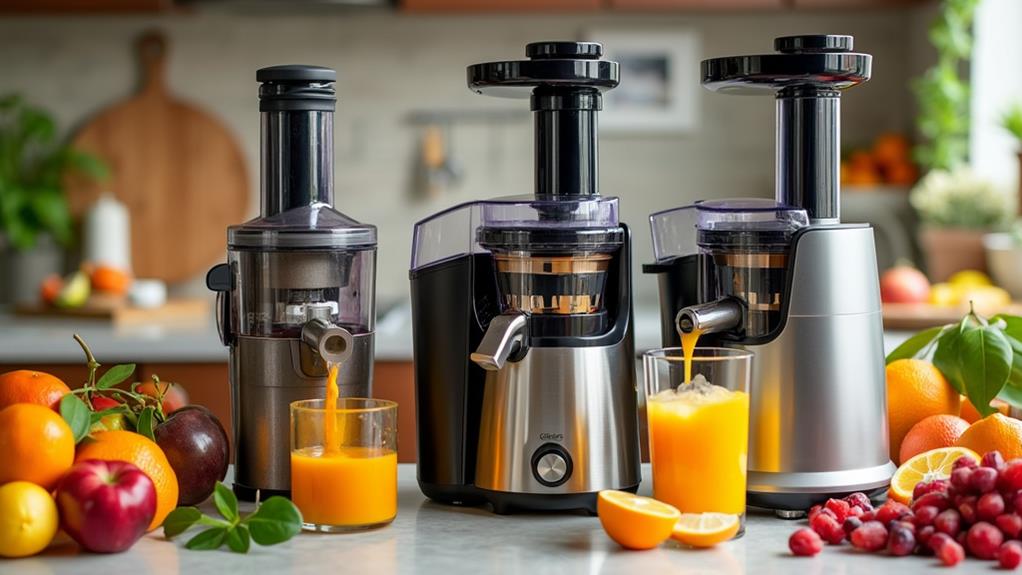
Regarding juicers, consumer preferences can greatly influence which model you decide to bring home. If you lead a hectic lifestyle, you might lean towards centrifugal juicers for their speed and convenience. These models whip up juice quickly, allowing you to fit the juicing process into a tight schedule. However, if you're health-conscious, masticating juicers might catch your eye. They offer superior nutrient retention and produce juice with a richer taste, appealing to those prioritizing quality.
Noise levels are another crucial factor. If quiet operation is significant to you, masticating juicers have an edge over their louder centrifugal counterparts. For many, starting the day without a noisy appliance is a notable plus. Additionally, taste preferences vary widely among consumers. You might find yourself preferring the fresher, thicker juice provided by masticating models, contributing to their growing popularity.

